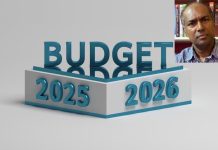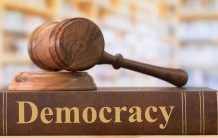In the context of the forthcoming General Elections, all Religious Leaders need to launch a nationwide campaign themed ‘Choose Representative with values’ by appealing to all Mauritians to evaluate their respective representatives for the National Assembly offering themselves for elective positions against the national values and principles. Choosing our Representative with values is the first step towards transforming our country into a peaceful and cohesive nation that is responsive to the needs of its people.
All Religious Leaders, as critical moral, social, and political agents of development, have an important role in shaping and influencing the development of all aspects of our lives. They can play a peacemaking role by calling for non-violence, tolerance, and mutual respect, and help ensure that elections remain peaceful, thus preserving democracy.
All religious organisations and Religious Leaders have access to all levels of power, community, national and international, giving them the ability to address national issues at multiple levels. Religious communities are the largest and best-organised civil institutions in our country, claiming the allegiance of thousands across race, class, and national divides. These faith communities have particular cultural understandings, infrastructures, and resources. When people of any faith embrace the bold vision of pacific co-existence and solidarity, only then we can face insurmountable problems like poverty, health issues, injustice, inequality, and environmental degradation.
Religious Leaders can use their different platforms through their faith communities to hold sensitizing sessions for their congregants, hold events, and pray for the country in a bid to ensure that there is hope, peace and cohesion in the country. Our respective traditions call us to an even higher ideal. Our traditions summon us to encounter each other with deep reverence and a sense of sacred value. It is this reverence that motivates us to form relationships, enter into dialogue and seek deeper understanding of each other.
Therefore, we urge the Religious Leaders to use their platform, during sermons to encourage voters to select ‘Representatives with values’, who are endowed with strong human values, who actively work to reduce inequality, improve healthcare, education, and address poverty and who have strong human values, empathy, equality, justice, and a commitment to improving society for all people.
Our Religious leaders can often provide ethical and moral guidance to their communities and help voters to ponder on values such as justice, compassion, and the common good. They may also encourage civic participation based on religious principles that emphasize responsibility, honesty, and fairness. They can encourage politician to genuinely listen to the concerns of their constituents and strives to make policies that benefit everyone, especially the marginalized.
Our Religious traditions are among the few moral sources speaking about a single human community. Our unity does not imply or require uniformity or sameness; our human family celebrates life in the richness of cultures and depths of religious traditions. Therefore, Religious Leaders should warn politician, during their political meetings to avoid using communal and hate-speeches, that can incite to violence and undermine our democratic values.
During election campaigns, some politicians adopt negative behaviours that undermine the integrity of the democratic process. Rather than focussing on political or constructive debates, they resort to personal insults, attacking the character, family or the past of their opponents, making hate speech and making empty promises, thus diverting attention from substantive issues. Others make misleading statements to manipulate public opinion or discredit their opponents. Some candidates exploit existing social, ethnic, racial or economic divisions to polarise the electorate and gather the support of specific groups by fostering a “we against them” mentality. These behaviours not only degrade political discourse, but can also erode public confidence in the political system. Religious leaders must play a peacemaker role by calling for non-violence, tolerance and mutual respect and help ensure that elections remain peaceful, and should warn politicians to avoid using community and hate speech, at their political gatherings, which can incite violence and undermine our democratic values.
In conclusion, I will add that our religious traditions are among the few moral sources that speak of a single human community. Our unity does not imply or require uniformity or similarity. Our human family celebrates life in the richness of cultures and the depth of religious traditions. All religious leaders must launch a national campaign by calling on all voters to choose the representative with values who will be the first step towards the transformation of our country into a strong, peaceful and cohesive nation. Building a strong nation takes investment, job creation, infrastructure development and sustainable growth. This may involve fostering innovation, the development of Artificial Intelligence (AI) and ensuring equitable access to resources and opportunities for citizens.
It is crucial to coerce the newly elected government to get to work immediately to address priority issues and to focus on both economic stability and social harmony. It has a duty to build an inclusive and socially cohesive society by engaging different communities in collective action to advance a sustainable and prosperous democracy based on mutual responsibility, civic equality and a common vision of the future.
Bashir Nuckchady




![[Yoga] A shared legacy, a shared future](https://sundaytimesmauritius.com/wp-content/uploads/2025/06/Yoga-Article-HC-218x150.jpg)
![[Khutbah – La Réflexion du Vendredi] Tawakkul, la confiance absolue en Allah (swt)](https://sundaytimesmauritius.com/wp-content/uploads/2025/06/Tawakkul-218x150.jpg)

![[Poetry corner] In memory of my friend Swabir Goodur](https://sundaytimesmauritius.com/wp-content/uploads/2025/04/CASAM-218x150.jpg)
![[Beryl Rose] Hassam Choychoo s’est éteint à 75 ans](https://sundaytimesmauritius.com/wp-content/uploads/2025/06/503203338_602562678981625_1382864677359506026_n-150x150.jpg)

![[Lutte contre l’insécurité] Le PM annonce une refonte en profondeur de la police et une tolérance zéro face au crime](https://sundaytimesmauritius.com/wp-content/uploads/2025/06/force-policiere-e1750504149483-150x150.jpg)

![[Beryl Rose] Hassam Choychoo s’est éteint à 75 ans](https://sundaytimesmauritius.com/wp-content/uploads/2025/06/503203338_602562678981625_1382864677359506026_n-100x70.jpg)

![[Lutte contre l’insécurité] Le PM annonce une refonte en profondeur de la police et une tolérance zéro face au crime](https://sundaytimesmauritius.com/wp-content/uploads/2025/06/force-policiere-e1750504149483-100x70.jpg)